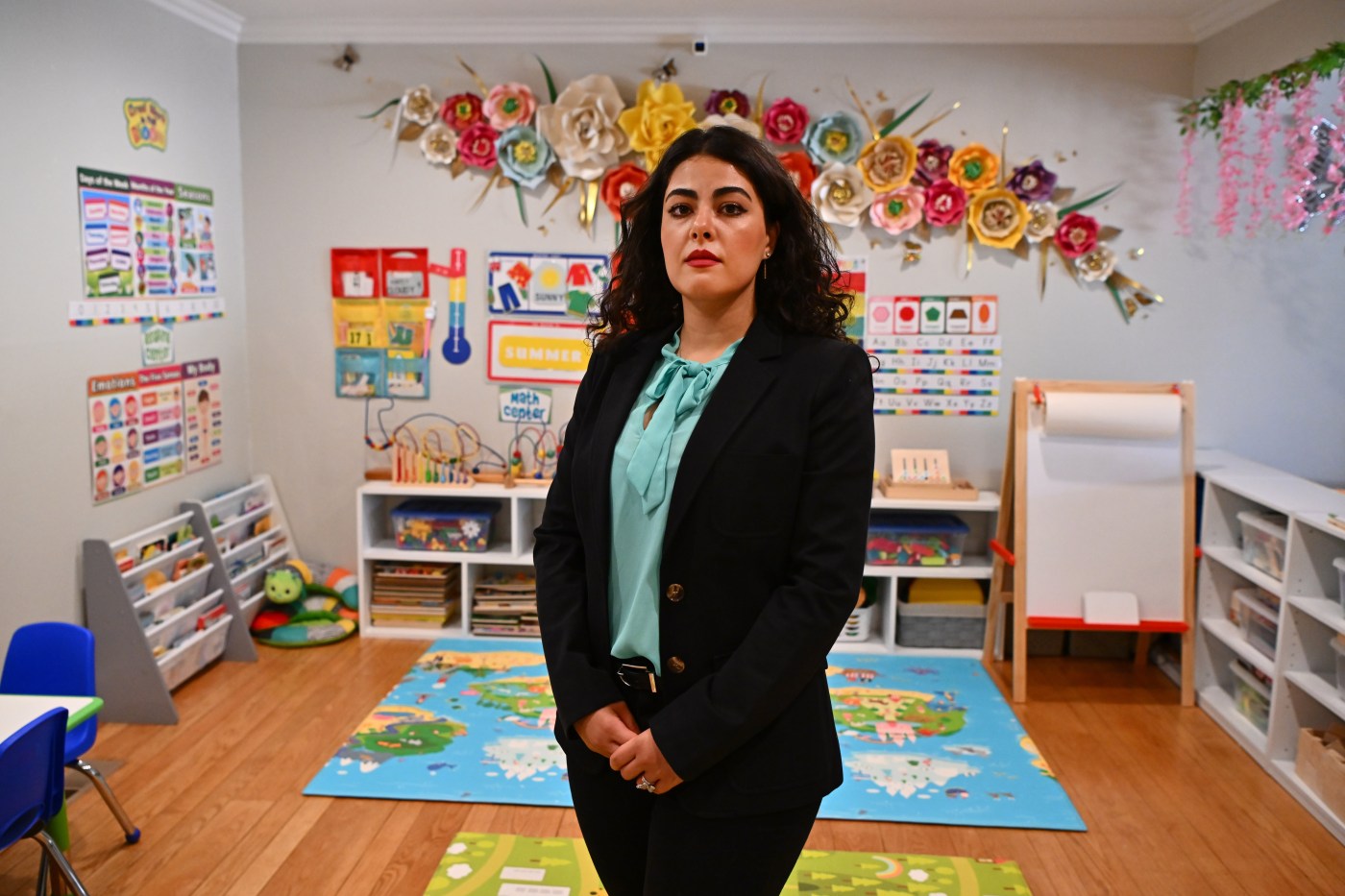One couple’s dream to open up more daycare, preschool and after-school slots at Jumping Lollipops in unincorporated Walnut Creek has devolved into an administrative “nightmare,” they say, as a series of contentious meetings have delayed expansion plans for four years, run up tens of thousands of dollars in fees and put the future of the business in jeopardy.
Nima Rafibakhsh, 35, and Delaram Mousavi, 34, are trying to get the green light to transition their existing “large family daycare,” which can serve up to 14 children, into a commercial child care facility that could welcome 48 kids.
But neighbors have opposed the plan, saying it will lead to traffic jams, noise, reduced property values and a general nuisance for those who live near the intersection of Woodlawn Drive and Mayhew Way.
This dispute is part of a larger issue in Contra Costa County, where demand for child care is outpacing supply. The combination of increasingly tight margins and the ripple effects of the pandemic continue to dramatically reduce available options — especially as median annual child care costs range between $14,000 and $20,000, according to Kidsdata.org.
In a 2018 needs assessment that projected out to 2027, Contra Costa County had 39,800 slots available — a supply that could only serve half of the county’s roughly 75,200 infants, preschoolers and school-age children who need care.
CoCoKids, a local early education nonprofit, reported that in June 2022, less than 13% of all infant care slots in the city of Walnut Creek were available for parents inquiring about enrollment, while fewer than 8% were open for preschool care serving children between the ages of 2 to 5.
The child care crisis is hitting families across the Bay Area. In 2022, Alameda County reported that 85% of infants and toddlers in working families did not have access to a licensed space.
Further south in Santa Clara County, there were roughly 19,240 children ages 0-2 years without access to child care in San Jose last year, according to a June 2023 needs assessment. Another 6,868 children had unmet needs across Sunnyvale, Santa Clara and Milpitas.
The fight in unincorporated Walnut Creek against vocal opponents of their plan — including a former school principal, a teacher, parents and small business owners — now leaves the fate of the residential child care business hanging precariously in the balance.
“We’ve been working and fighting with the county since 2020 to have child care for a small number of children,” Rafibakhsh said. “They make it so hard to do and are so slow to process anything, which is clearly part of the reason why there’s not enough child care here.”
After the county’s zoning administrator finally approved a land-use permit for their plans in June — after denying a similar application two years prior — two neighbors who live next door to the home-based child care facility quickly appealed.
Jason Martin and Christina Greystone repeatedly said they aren’t opposed to adding more child care options in Contra Costa County, but they refused to support Jumping Lollipop’s current proposal, which they say doesn’t belong in the quiet community.
Jason Martin, right, and Christina Greystone, neighbors with Jumping Lollipops daycare, speak before the Contra Costa County Planning Commission during a meeting appeal at Contra Costa County Department of Conservation and Development in Martinez, Calif., on Wednesday, Aug. 14, 2024. Martin, Grestoen, and several other neighbors are against expanding the daycare provider from 24 to 48 children in an unincorporated county street near Walnut Creek. (Ray Chavez/Bay Area News Group)
“We all see flaws in this plan,” Greystone said during Wednesday’s planning meeting. “I don’t want to see our neighborhood change with the hopes that this is going to work.”
While Rafibakhsh and Mousavi are quick to defend their neighbors’ right to complain about their project, they say the community has refused to accept county research showing that their child care center won’t create a nuisance.
Unlike larger child care corporations, such as Bright Horizons and Genius Kids, Rafibakhsh said his family doesn’t have the budget to continue jumping through neighbor’s hoops or look at larger, more expensive spaces.
Rafibakhsh and Mousavi say they may have no choice but to shutter Jumping Lollipops for good if their proposed 48-child expansion plan isn’t approved.
“That is not something (my wife) and I can afford because we are just regular people that want to start a small child care,” Rafibakhsh said, adding that he wishes county officials would do more to advocate for creative, expansive solutions for a small business like theirs. “Everybody talks about child care, but when it comes to action, you really don’t see any — they just put roadblocks in front of you.”
Another roadblock materialized just last week.
The Contra Costa County Planning Commission on Wednesday denied neighbors’ appeal of Jumping Lollipops’ permit, but they did vote 3-1 to modify the conditions of approval of the land use permit: capping capacity at 30 children. That decision, while counter to the staff’s recommendation, was based on the California Department of Social Services’ square footage standards per child.
Rafibakhsh and Mousavi are planning to appeal to the Board of Supervisors this week, hoping that the county’s top executives will not fold to neighborhood pressure and criticism.
Neighbors who are against Jumping Lollipops daycare expansion from 24 to 48 children pay attention to owners Nima Rafibakhsh and his wife Deleram Mousavi as they speak before the Contra Costa County Planning Commission at Contra Costa County Department of Conservation and Development in Martinez, Calif., on Wednesday, Aug. 14, 2024. The daycare provider located in unincorporated county street near Walnut Creek, has struggled since 2020 to expand its services. The neighbors filed an appeal to sptop thre project. (Ray Chavez/Bay Area News Group)
Jennifer Cruz, the county’s principal planner who has helped Rafibakhsh and Mousavi draft up their most recent project proposal, said Contra Costa County’s elected officials have amended its code multiple times in the past decade to keep up with ever-changing child care regulations — including a 2022 change that would allow for Jumping Lollipops’ expansion.
Related Articles
How Bay Area cities are responding to Newsom’s calls for homeless sweeps after landmark Supreme Court ruling
The rules for homebuyers and sellers are changing in California. Here’s what you need to know.
Opinion: Keeping the Bay Area at the center of global innovation
Redevelopment of Diridon Station could cost taxpayers $10 billion
Editorial: California voters should OK modest minimum-wage increase
Cruz said the county’s General Plan explicitly encourages child care in residential areas, as well as locations near employment centers, school sites, hospitals, parks and transit routes — a policy aimed at helping increase parents’ autonomy and ability to choose where their children learn.
After that extensive explanation did not sway neighbors’ opinions, Rafibakhsh chalked up the ongoing pushback to typical “NIMBY” behavior — a phrase coined for people who support development as long as it’s “not in my backyard.”
“I know the neighbors unfortunately don’t like it, but it’s a perfect place for child care, so we are going to push as much as we can – full power,” he said. “But it’s been an absolute nightmare.”
Jumping Lollipops daycare owners Nima Rafibakhsh, right, and his wife Deleram Mousavi, speak before the Contra Costa County Planning Commission at Contra Costa County Department of Conservation and Development in Martinez, Calif., on Wednesday, Aug. 14, 2024. The daycare provider, located in an unincorporated county street near Walnut Creek, has struggled since 2020 to expand its services from 24 to 48 children. The neighbors filed an appeal to stop the project. (Ray Chavez/Bay Area News Group)












